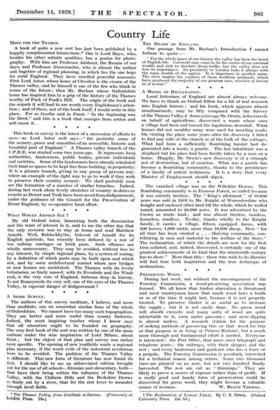PRESERVING WOOD.
During last week, not without the encouragement of the Forestry Commission, a wood-preserving association was formed. We all know that timber starvation is threatened and most countrymen know that much wood lasts a tenth or so of the time it might last, because it is not properly treated. To preserve timber is as useful as to increase the supply ; but it is not easily done. No green wood will absorb creosote and many sorts of wood are quite intractable to it, even under pressure ; and mere dipping is almost useless. A research station for the purpose of seeking methods of preserving this or that wood for this or that purpose is in being at Princes Risboro', but a much more thorough and fundamental effort is needed. Everyone is interested : the Post Office, that must erect telegraph and telephone posts ; the railways, with their sleepers and the rest ; and every landowner and gardener who has a fence or a pergola. The Forestry Commission is peculiarly interested for a technical reason among others. Some two thousand trees are planted on an acre, but not two hundred finally
harvested. The rest are cut as " thinnings." They are likely to prove a source of expense rather than of profit. If
a really good and handy form of preservation could be discovered for green wood, they might become a valuable
* The Thames Valley, from Cricklade to Staines. (University of t The Reekimation of Exmoor Forest. By C. S. Orwin. (Oxford












































 Previous page
Previous page